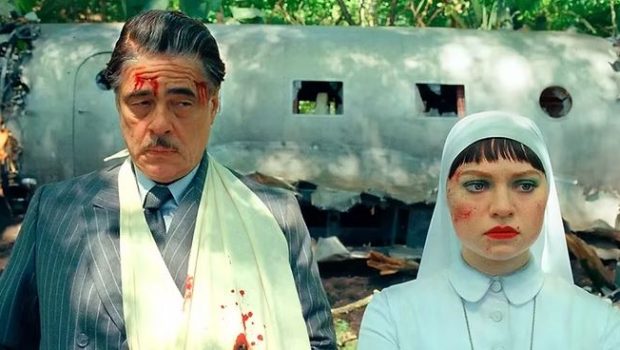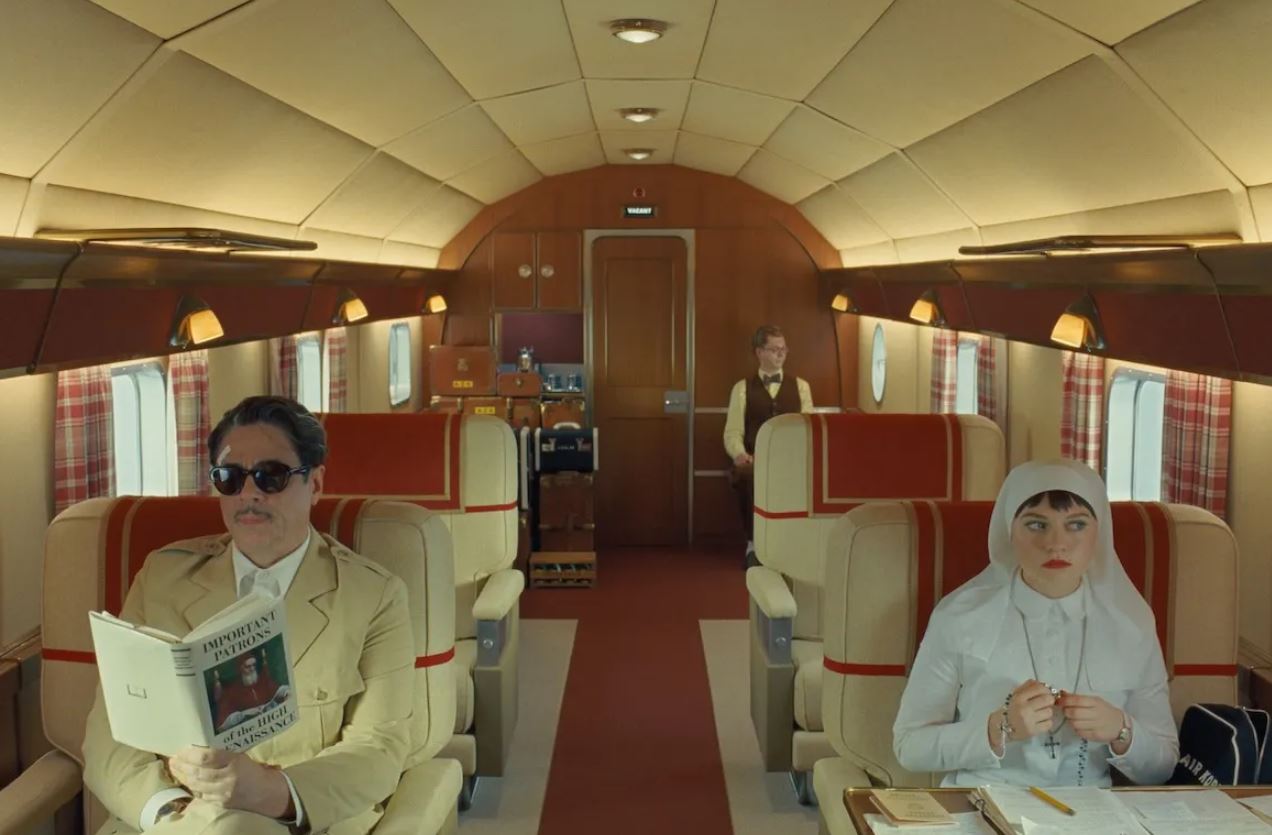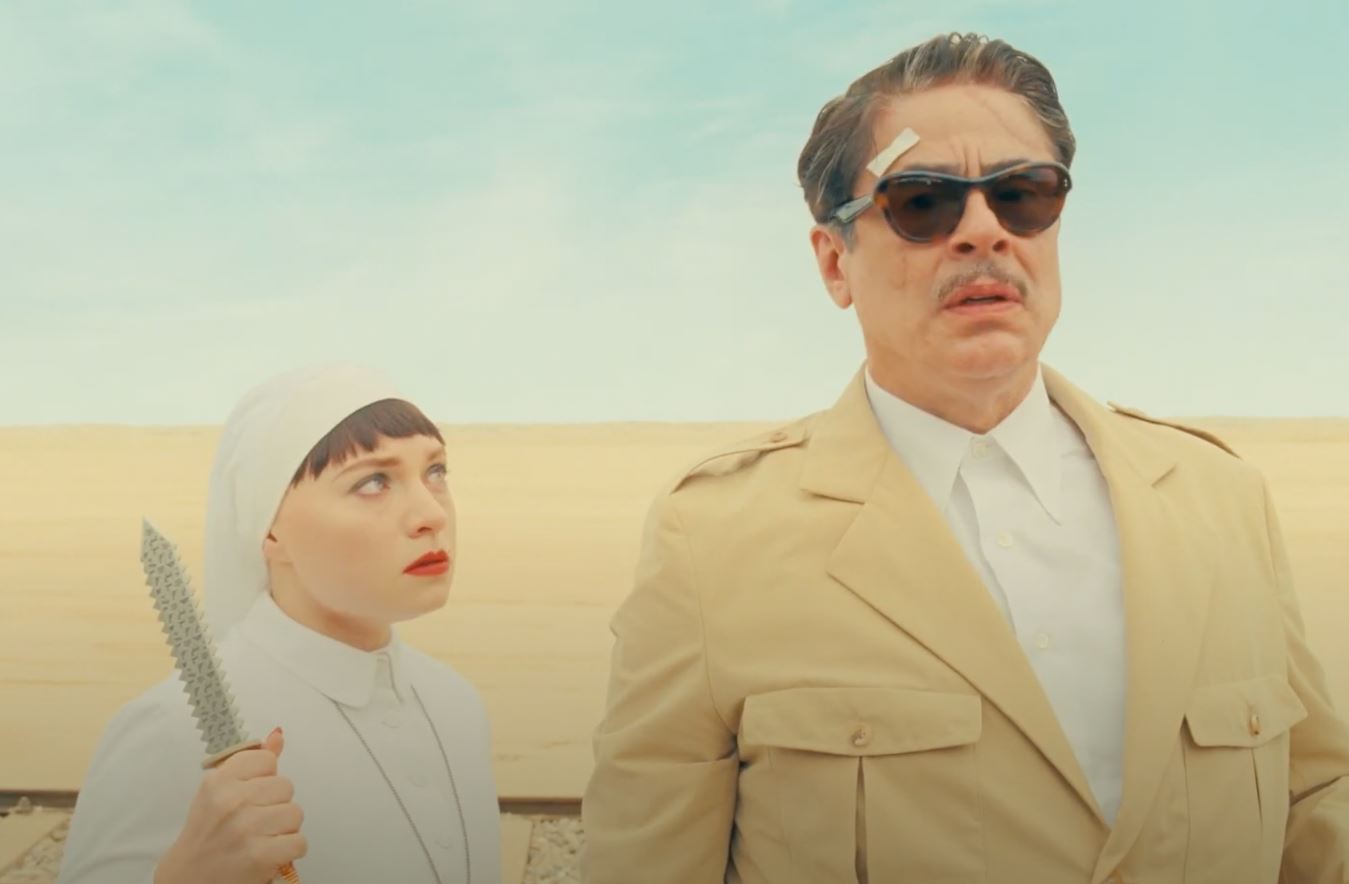The Phoenician Scheme – Film Review
Reviewed by Damien Straker on the 9 June 2025
Universal presents a film by Wes Anderson
Screenplay by Wes Anderson
Produced by Wes Anderson, Steven Rales, Jeremy Dawson, and John Peet
Starring Benicio del Toro, Mia Threapleton, Michael Cera, Riz Ahmed, Tom Hanks, Bryan Cranston, Mathieu Amalric, Richard Ayoade, Jeffrey Wright, Scarlett Johansson, Benedict Cumberbatch, Rupert Friend, and Hope Davis
Cinematography Bruno Delbonnel
Edited by Barney Pilling
Music by Alexandre Desplat
Rating: M
Running Time: 105 minutes
Release Date: the 29th of June 2025
Wes Anderson’s new film The Phoenician Scheme opens with a bang. In 1950, a wealthy arms dealer named Korda (Sicario’s Benicio Del Toro) sits inside his private plane. Suddenly, an explosion rips the aircraft apart and splits one of Korda’s own men in two! Somehow Korda narrowly survives the explosion and crawls out from beneath the plane wreckage. Realising his mortality, he reconsiders his future and to whom his company should belong.
He intends to put his daughter in charge but there is tension between them. Liesel (Mia Threapleton, Kate Winslet’s daughter) is a practicing nun and suspects Korda had her mother killed. It’s a claim he regularly denies. Meanwhile, a shadowy government agency called Excalibur is attempting to sabotage Korda’s company. Their meddling presses Korda and Liesel to find investors and save the company. The father and daughter are accompanied by a Norwegian entomologist named Bjørn (Michael Cera) who might be more than he seems.
Over the last two decades, Wes Anderson’s output of work has been frequent. Every two or three years he will release a full-length feature and short movies between these larger projects. With how fleeting the entire film industry is, his urgency is justified. There has always been an appetite for such idiosyncratic work. Anderson’s last feature, Asteroid City (2023), more than doubled its budget. Who knows what the future holds? Even an experienced filmmaker like Wes Anderson might not always receive the funding he needs.
The uncertainty is why he sometimes makes more measured films. ‘More’ is a word that has stumbled this sometimes-perplexing filmmaker. The abundance of rich, pastel colours, the rapid-fire dialogue, and symmetrical set designs are common, recognisable artistic staples of Anderson’s oeuvre. Yet his films’ successes hinge though on how restrained he chooses to be when deploying these tropes. Sometimes the stylistic flourishes render them pretty but overstuffed and incoherent. In filmmaking, restraint goes a long way.
The Life Aquatic with Steve Zissou (2004) arguably suffered from being too much of a good thing. Isle of Dogs (2018) is one of his best films though. His second foray into stop-motion animation made his filmmaking selective. Scheme receives a pass mark for not being too over-the-top when embracing Anderson’s trimmings. However, it also devolves into a greatest hits collection. It revisits his past themes without adding anything particularly novel. It is not a terrible film, but it won’t surprise Anderson apologists or convert his detractors.
In terms of character development, there is something admirable about Anderson wanting to see insufferable businessmen become unselfish and vulnerable. As soon as one hears the word ‘tariffs’ it is not hard to suggest Donald Trump is, like everyone else, on Anderson’s mind. Even starting the story with a failed assassination attempt is a timely coincidence.
The story’s trajectory is that Korda will grow closer to his daughter as she herself finds young love. The theme and the intent are admirable. However, it is also one Anderson has regularly explored. The Royal Tenenbaums (2001) was about an old man dying who wanted to reconnect with his family. The Grand Budapest Hotel (2014) was about a selfish businessman who sacrificed everything for his young companions. The short film The Wonderful Story of Henry Sugar (2023), one of his best works, expertly unpacked the same narrative in half the time.
Despite the derivative themes, there are pleasures in Scheme. One example is a basketball game doubling as a business deal. Set in a train tunnel, it becomes the film’s most memorable scene. The winner of the best of three will be the victor except someone on Korda’s side has no idea how to play. It’s a fun, comedic sequence that shows how ridiculous business is. It also acts as a nice contrast to the obvious themes: business is a ruthless and sometimes violent world that isolates people from their families. Who knew?
At least the ruthlessness of these businessmen has weight to it. The opening bomb blast underlines this and so too does another moment where Korda again defies death. His second near-death experience is arguably his greatest catalyst for change. As for visual flourishes, long symmetrical passages are visible, particularly on the insides of the planes. The colours are more subdued than usual though. The darker grey and brown tones reflect the 1950s period and the cold feelings Korda and Liesel share. The most expansive design is during a series of weird black and white dream sequences set in the afterlife. It’s again showing a man reflecting on the outcomes of his poor life decisions.
Mia Threapleton and Benicio Del Toro’s deadpan performances adeptly capture the dark comic tone. The moody style suits the icy nature of their father-daughter relationship. Once Liesel whips out a blade it becomes apparent they are more alike than we first suspected. While this is not the funniest Anderson film, Michael Cera is still capable of bringing some big laughs. His injection into Barbie (2023), Dream Scenario (2023), and this film proves he is a scene-stealer and very good at self-deprecating humour. Richard Ayoade also has a small funny part as a guerrilla fighter, which also adds to the story’s danger.
Less pleasing is Anderson’s reliance on cameos in service of fully drawn characters. Bill Murray only has a tiny part but who cares? Scarlett Johansson and Benedict Cumberbatch though warrant more than a few small scenes in the whole film. Nonetheless, Cumberbatch’s bearded appearance and shaggy eyebrows make him appear hilariously weird and menacing as Korda’s half-brother. It might have been more fun and deadly if he was somehow peppered throughout the entire film. At least the climatic fight with lamps is worth seeing.
The Phoenician Scheme has a comprehensive story arc that transforms a flawed businessman into someone warmer and humbler. The ending is probably the most surprising part. The rest of the film retreads the same themes and ideas sprinkled throughout Anderson’s filmography. It doesn’t hurt to explore these again, especially through a modern context, but it is unlikely to surprise you or linger afterwards. It is also nice that Anderson does not let his visuals replace the story. Once again you won’t be completely dazzled by anything you see. It’s comfortably in the middle of his work: competently made and well-acted but unlikely to change anyone’s mind about his quirkiness.
Summary: It’s comfortably in the middle of Anderson's work: competently made and well-acted but unlikely to change anyone’s mind about his quirkiness.









